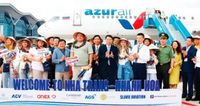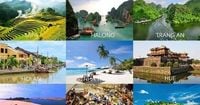As Vietnam continues to recover from the pandemic, the country's tourism sector is witnessing a remarkable resurgence, particularly with a significant influx of Russian tourists. Recent statistics indicate that searches for travel information about Vietnam from Russian tourists and those from the CIS countries have surged by 35%, according to Malinovskii Roman, Vice President of the Asia-Europe Business Association.
Prominent cities like Nha Trang, Phu Quoc, Hanoi, Ho Chi Minh City, Da Lat, and Da Nang have seen search increases of up to 130%. This growing interest is translating into tangible results, with nearly 80,000 Russian tourists visiting Vietnam in the first two months of 2025 alone—a staggering 204% increase compared to the same period last year.
Currently, Russia stands as the largest source of tourists among European nations heading to Vietnam. Bui Lan Huong, Director of An Tuong Nga Company, noted that Russian travelers are particularly drawn to destinations like Nha Trang, Da Nang, and Phu Quoc, known for their stunning beaches and high-end resorts.
According to the World Tourism Organization (UNWTO), Russian tourists typically spend around $2,000 per trip, with $610 allocated for expenses outside of their tours—40% higher than the average spending of international tourists. This high spending power makes Russian visitors an attractive target for Vietnam's tourism industry.
Oleg Kozyrev, Marketing Director of Travelata.ru, emphasized that Vietnam's position in the organized tourism market of Russia is rapidly returning to pre-pandemic levels. A key factor in this resurgence is the revival and expansion of direct flights between Vietnam and major Russian cities. As of March 16, 2025, the Civil Aviation Authority of Vietnam has authorized Azur Air to operate direct flights from 11 Russian cities to Cam Ranh (Khanh Hoa), with a frequency of 14 flights per week. Additionally, Aeroflot has resumed flights from Moscow to Ho Chi Minh City and is operating the Moscow-Nha Trang route, starting March 22, 2025, with three flights per week. Vietnam Airlines is also set to launch a new route from Moscow to Hanoi in May 2025.
These direct flights not only shorten travel times but also enhance convenience, particularly for Russian families seeking extended vacations. Yandex Travel noted a 49% increase in air ticket sales to Vietnam compared to the previous year, with the average ticket price hovering around 81,000 rubles (approximately $950). Russian Express reported that ticket sales for flights to Vietnam have skyrocketed by 5.5 times compared to the same period last year.
As Vietnam gears up to welcome a projected 500,000 Russian tourists in 2025, the competition among travel destinations intensifies. Ms. Doan Thi Thanh Tra, Deputy General Director of Saigontourist, pointed out that there is a shortage of high-end hotel rooms during peak seasons, which poses a significant challenge. Furthermore, many regions in Russia still lack direct flight connections to Vietnam, complicating travel logistics.
Pham Minh Nhut, Standing Vice President of the Nha Trang Tourism Association, highlighted that Russian tourists tend to stay for extended periods, making it crucial for the Vietnamese tourism sector to offer diverse and enriching experiences. He urged businesses to prepare meticulously, especially for beach tours, cultural experiences, and wellness retreats, to keep visitors engaged.
Nguyen Le Phuc, Deputy Director of the Vietnam National Authority of Tourism, emphasized the importance of local tourism promotion and leveraging digital platforms and Russian-language content to attract more visitors. The media in Russia has recognized Vietnam as a formidable competitor, not just against Thailand, which is becoming overcrowded, but also directly against Turkey and Egypt. The shorter distance from Siberia and the Far East of Russia to Vietnam further enhances its appeal.
In addition to the influx of Russian travelers, Vietnam's overall tourism industry is experiencing robust growth. Recent data from Google indicates that international searches for tourist accommodations in Vietnam increased by 30% from late November last year to the end of January this year. At a discussion on key AdTech trends affecting mobile application development in 2025, representatives from Yango Ads revealed that Vietnam welcomed 17.5 million international visitors last year, generating approximately 840 trillion VND in tourism revenue.
Ho Chi Minh City continues to lead the nation in visitor numbers, with an estimated 6.1 million international tourists contributing to a total tourism revenue of around 190 trillion VND last year. In the first two months of 2025, the country welcomed over 3.96 million international visitors, reflecting a 30.2% increase compared to the same period last year.
However, as Vietnam rises to prominence as a preferred travel destination in Southeast Asia, it faces fierce competition from neighboring countries like Thailand and Malaysia. The tourism sector must innovate and adopt effective advertising strategies to maintain its competitive edge. Social media advertising, in particular, presents a fertile ground for growth, as over 90% of travelers actively share their experiences online, influencing potential visitors.
Despite the promising outlook, many destinations in Vietnam are still underrepresented on digital advertising platforms and social media, hindering their ability to attract international tourists. Ms. Thu Nguyen, Business Development Manager of Yango Ads in Vietnam, stressed the need for travel businesses to implement practical solutions to enhance competitiveness and maximize campaign effectiveness. She highlighted the importance of understanding the travel needs of tourists from different countries by analyzing their mobile usage behavior, habits, and cultural characteristics to develop tailored strategies.
While the government encourages digital transformation in tourism, many Vietnamese travel companies struggle to keep pace due to a lack of expertise in advertising technology, particularly among smaller, budget accommodations. Nevertheless, experts believe this situation will improve soon, as young Vietnamese quickly adopt new technologies, propelling the tourism sector to new heights.






